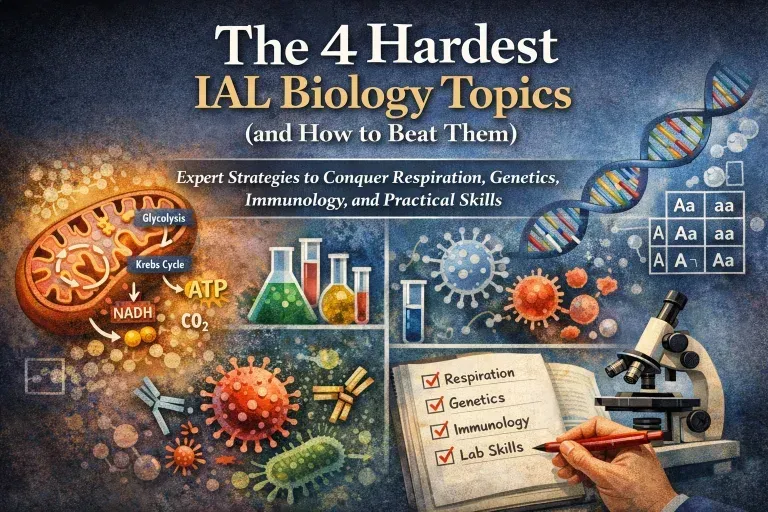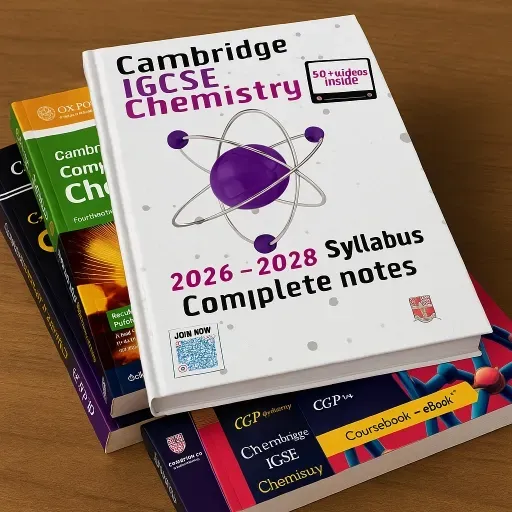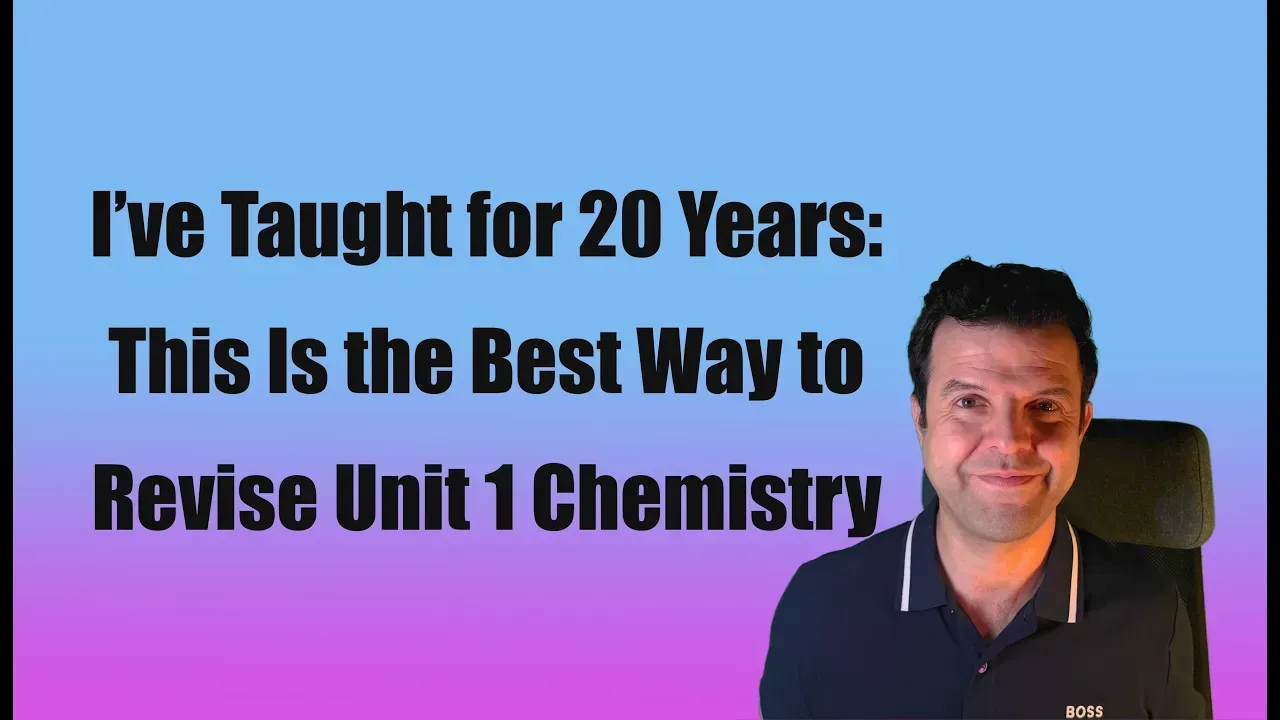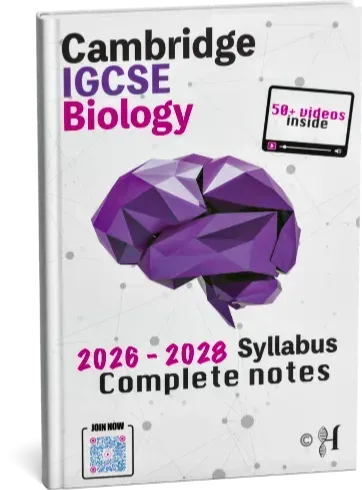Fallen Behind After October exams? Here’s the Fastest Way to Catch Up for 2026
Your recovery plan for IGCSE after October exams

Let me be straight with you: if you bombed your October or November exams, you're not alone. But waiting around won't help. The good news? You can catch up—if you do it the right way.
This guide breaks down exactly how to get back on track for your 2026 exams.
Start With the Most Important Topics First
Don't open your textbook and start from page one. That's a waste of time.
Instead, focus on the core topics that everything else depends on. For IGCSE Biology, that's five main topics:
1. Features of organisms
2. Movement into & out of cells
3. Biological molecules
4. Enzymes
5. Respiration
For Chemistry, it's three:
- Atomic structure
- Chemical bonding
- Stoichiometry
Master these first, and the rest becomes easier to understand ^1.
Why? Because these topics are the foundation. Once you understand them, new material makes more sense. You stop feeling confused all the time.
How long does this take? If you use focused video lessons, you can nail these core topics in a single weekend ^1.
Find Your Weak Spots and Attack Them First
Pull out your recent exam papers or practice tests. Where did you lose the most points?
Start there—not with the topics that come first in your textbook.
This strategy works because:
- You close knowledge gaps before they get worse
- You see improvement quickly, which keeps you motivated
- You stop wasting time on stuff you already know ^2
Use a Study Schedule That Actually Works
Here's what research shows: studying in short bursts beats marathon sessions ^4.
Use this structure:
- Study for 25 to 45 minutes at a time
- Take a short break (5–10 minutes)
- Switch to a different subject to keep your brain fresh Repeat
This approach prevents burnout and helps you remember more ^4.
Pro tip: Schedule your hardest subjects during the times when you're most alert. For most students, that's mid-morning or early afternoon ^2.
Practice With Real Exam Questions
Start using past papers as soon as possible. Here's how to do it right ^2:
Week 1–2: Open-book practice
- Use your notes and textbooks while answering questions
- This builds familiarity with how exams are structured
- You learn what examiners actually ask for
Week 3–4: Timed practice
- Set a timer and answer questions under exam conditions
- No notes allowed
- This builds speed and confidence
Final weeks: Full mock exams
- Take complete exams under timed conditions
- This shows you exactly what you still need to study ^2
Use Active Recall and Spaced Repetition
Active recall means testing yourself instead of just reading. Here's why it works: when you struggle to remember something, your brain holds onto it longer ^4.
Try this:
- Close your book
- Write down everything you remember about a topic
- Check your notes
- Review what you missed a few days later
Spaced repetition means reviewing material at specific times:
- Review after 1 day
- Review after 3 days
- Review after 1 week
- Review after 2 weeks
This timing helps move information from short-term memory to long-term memory ^4.
Watch Recorded Lessons at Your Own Pace
If you missed lessons, recorded videos let you learn the material without feeling rushed. You can pause, rewind, and watch confusing parts twice ^1.
Bonus: Use these videos to fill specific knowledge gaps instead of rewatching entire units ^1.
Draw Mind Maps to Connect Ideas
Mind maps help your brain see how topics connect. Instead of memorizing isolated facts, you see the bigger picture ^3.
How to make one:
- Write the main topic in the center
- Draw branches for subtopics
- Add details to each branch
- Use colours and images to make it stick in your memory
This visual approach helps you recall information faster during exams ^3.
Why Structured Programs Help
When you're already behind, making decisions about what to study next drains your mental energy. A structured program removes that problem ^1.
Good programs include:
- Focused videos on the highest-yield topics
- Weekly study plans that keep you on track
- Built-in active recall and spaced repetition
- Clear timelines so you know what to study when ^1
The Timeline: How Fast Can You Catch Up?
Here's what's realistic:
- Core topics: 1 weekend (with focused videos)
- Weak areas: 2–4 weeks (depending on how many)
- Past paper practice: 4–6 weeks
- Full mock exams: Final 2–3 weeks ^1
Total: You can make serious progress in 8–12 weeks if you stick to the plan.
What Actually Works: The Data
Research on learning shows these methods work best ^4:
| Study Method | Effectiveness |
|---|---|
| Passive Reading | Low |
| Active Recall | High |
| Spaced Repetition | High |
| Practice Testing | Very High |
| Combining Multiple Methods | Highest |
The students who catch up fastest use all of these together, not just one ^4.
Your Action Plan Starting Today
- Today: Review your recent exam papers. Identify your three weakest topics.
- This weekend: Watch focused videos on your core topics.
- Next week: Start with your weakest areas using active recall.
- Weeks 2–6: Follow a weekly study schedule. Rotate subjects daily.
- Weeks 7–8: Start practicing with past papers (open-book first).
- Weeks 9–12: Move to timed practice and full mock exams.
The Bottom Line
Falling behind doesn't mean you're done. It means you need a better strategy.
Focus on core topics first, target your weak spots, use active recall and spaced repetition, and practice with real exam questions. Stick to a structured schedule, and you'll catch up faster than you think.
By June 2026, you won't just be caught up—you'll be ready.
Sources
- YouTube video: "How to Catch Up After the October Exams" by chem-bio.info
- chem-bio.info articles on rapid revision and study strategies
- chem-bio.info study tips to improve your IGCSE exam grade
- General A-Level study tips and exam techniques
Try a free Class
IGCSE and IAL Guide for 2025 - 2026 Exams















